I read a little less broadly than usual this month, but if you’re interested in books about books or deep-dives into faith, family, and education, I have a great assortment of books for you. Let’s get to those reviews!
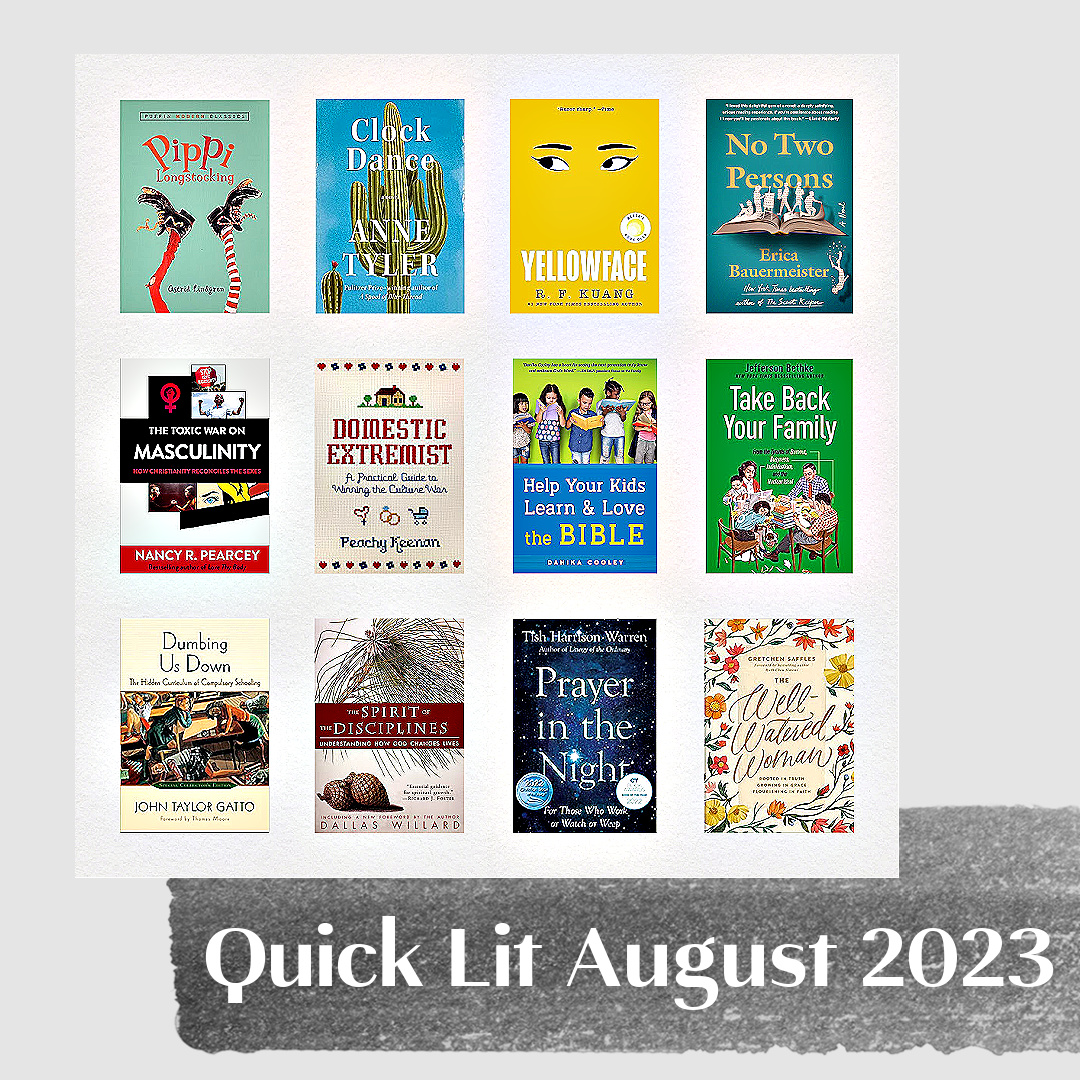
FICTION
No Two Persons, by Erica Bauermeister: Every once in a while, I read a book that is so beautiful, so impactful, so profound, that I’m hesitant to review it because there is hardly anything I can add to the conversation the book has presented. No Two Persons was one of those books, and though my review won’t do it justice, let me to try to convince you that it needs to be your next read.
The formatting is unconventional: this is technically a short story compilation, surrounding a single novel and its impact on ten different individuals—the author, the audiobook narrator, the literary agent, and others who cross paths with the book at pivotal moments. Each unique individual has an equally unique experience with the book, but each comes away changed as they gain new perspectives, come to see new ways forward, or simply feel seen and understood for the very first time.
No Two Persons is a powerful tribute to books and how they shape our lives, often in the most unexpected ways. Bauermeister has gifted us with a feast of delectable, immersive prose and characters so real I expected some of them to appear in front of me whenever I looked up from the page. Every single story is mesmerizing, and most offered fascinating windows into new worlds—from audiobook narration, deep sea diving, and the study of leap sounds, to intimacy coordination, bookselling, and foraging. There are complex dynamics (a strained mother/daughter relationship, a budding romance that falls flat, a grieving widower attempting to connect with the wife who is already gone) and hard emotions (of loneliness, abandonment, irrelevance). Seeing these characters, feeling what they felt and experiencing what they have experienced, allowed me to feel seen and tap into my own experiences—not at all unlike the characters themselves as they read the novel at the center of this one.
The stories are tied loosely together with some intriguing call-backs and themes that emerge across multiple stories, but mostly they could stand alone, and each one is deserving of an entire book. I had a hard time leaving these characters as their stories concluded, especially Nola, the brilliant teenager without a home or a family whose story wrecked me.
A character in the novel comments that books were like “a giant neighborhood where every family was different, and every door was open.” I savored every moment of seeing into the doors of this neighborhood, connecting with the experiences in each home, absorbing their histories and emotions and truth. This is my favorite book of 2023, and I have a hard time imagining it will be unseated.
My Rating: 5 Stars // Book Format: Print
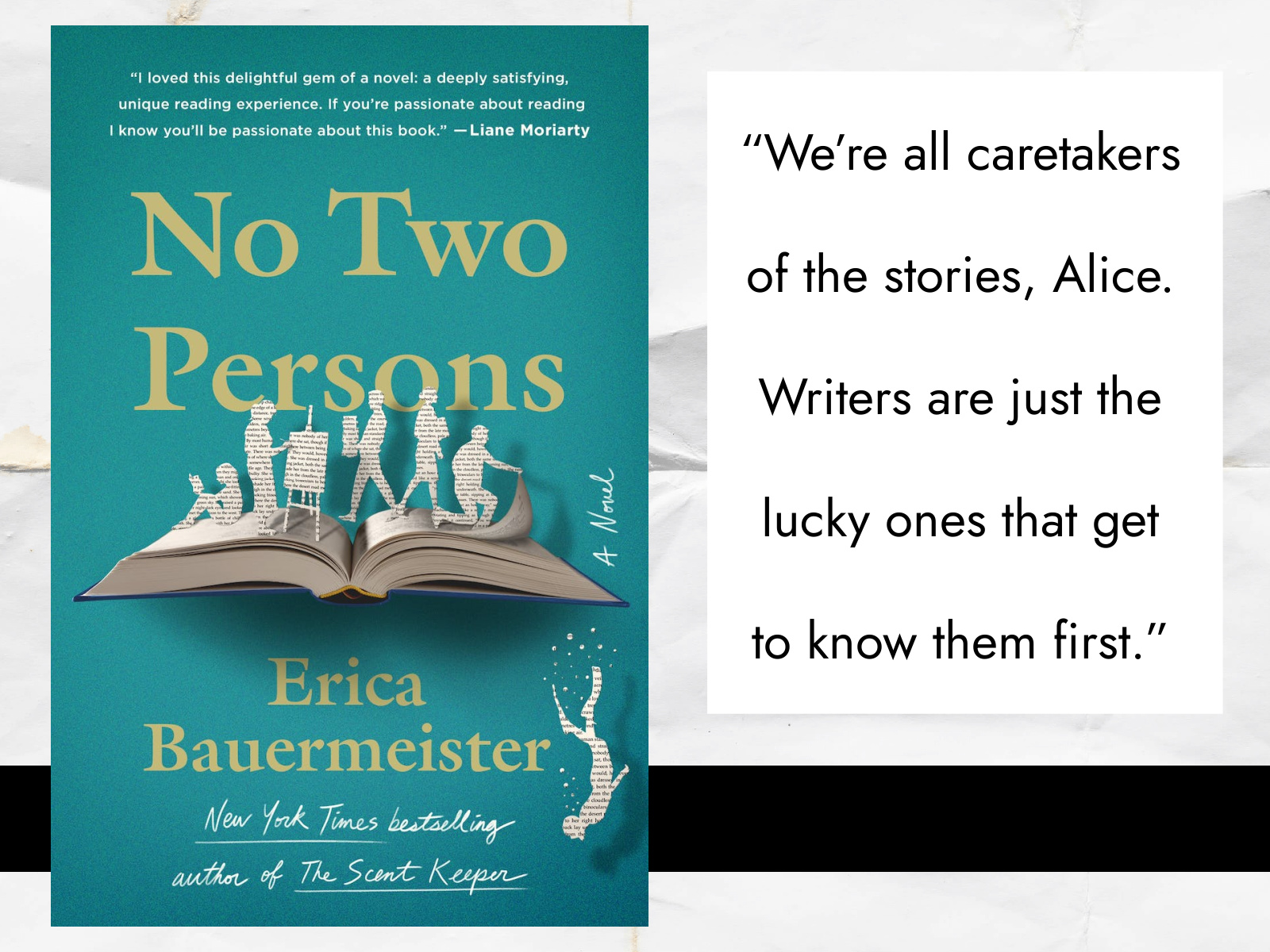
Yellowface, by R.F. Kuang: June Hayward is an aspiring author with big ambitions and little to show for them. June’s lackluster launch into publishing is made more painful as she witnesses the of her college friend, Athena Liu; Athena is a Chinese-American woman who has capitalized on her minority status to become the literary darling that June, “a basic white girl”, could never be.
But . . . June’s opportunity for literary acclaim appears one night when June witnesses the death of Athena in a freak accident. On impulse, June steals the complete manuscript sitting on Athena’s desk and decides to pass the masterpiece off as her own. But June is unsure whether the story of Chinese laborers during World War I will be received well from a white author, so she rebrands herself as Juniper Song and attempts to “pass” as an author of color.
All goes well for a while, but soon there are rumbles in the literary world that June is not who she claims to be, and that this work may not be her own. June is questioned and canceled, and each attempt at reimagining her identity and her work worsens her image. She must decide what lengths she will take to continue pursuing her passion of writing while also maintaining prominence in the limelight. But is that possible, and is it worth it?
This book is WILD and will make your blood boil, regardless on where you stand on these controversial issues of plagiarism, cancel culture, racism, cultural appropriation, cyberbullying, and representation. Kuang eviscerates the publishing industry, the film industry, academia, AND social media in ways that are only possible for someone intimately familiar with these realms. I have a hard time imagining this book getting published by an author without Kuang’s status and reputation, and I am glad that she chose to wade into such murky waters with this book that will leave many rethinking our understanding of the stories we are reading. Her insights into the writing process and the nature and framing of stories and of truth are also fascinating and especially poignant given her career trajectory.
Kuang presents many questions in this novel and provides few answers; I came away without a firm grasp of how she herself would answer the questions of whose stories should be told and who has the right to tell them, and I think I like that this was more of a thinking than a telling/preaching book. This is a story that demands to be discussed! And while the characters are horrible, the various plot turns are maddening (with some absurd twists that were pretty over the top), and the issues are uncomfortable and complex, it’s a book that goes down real smooth—it’s not a thriller, but it reads like one, and it drew in my Schadenfreude gaze like few books I’ve read. Incredibly timely and oh, that cover!
My Rating: 4.25 Stars // Book Format: Kindle
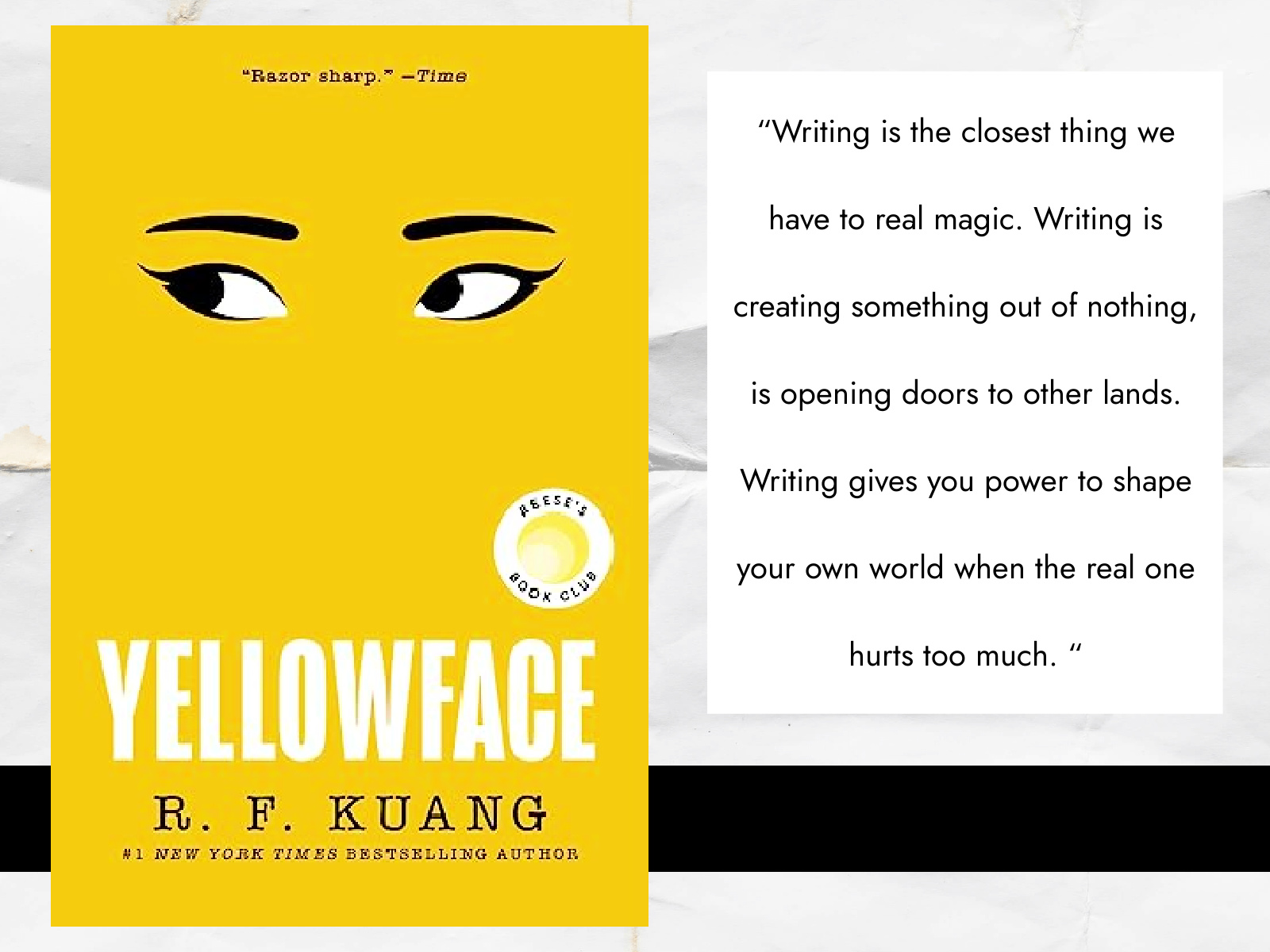
Pippi Longstocking, by Astrid Lindgren: Nine-year-old Pippi Longstocking is a red-headed, freckled child with superhuman strength, a quirky sense of humor, and total disregard for cultural norms. The daughter of a widowed buccaneer captain who was lost at sea, Pippi shares her home of Villa Villekulla with her pet monkey and a horse who lives on the porch. Shortly after moving into her home, Pippi befriends Tommy and Annika, the two neighbor children, and she delights them with her eccentric housekeeping, her thirst for adventure, and her endless tall tales.
I loved this book as a child and was drawn to Pippi’s confidence, eccentricities, and zany adventures. I even went through a phase of sleeping “backwards” (feet on the pillow, head beneath the covers) to be like Pippi. While I still enjoyed the book with this reading, it lands a lot differently as an adult. I now recognize Pippi’s inappropriate behavior (impoliteness, lying, and misguided attempts at fitting in) to be symptoms of her abandonment/neglect. Not to get too armchair-psychologist with my reading, but Pippi is clearly a wounded child whose trauma is undetected by adults in her community who are too overwhelmed by her poor behavior, or blinded by her false maturity, to step in.
These aspects to Pippi’s character will go over children’s heads, as they should; for them, Pippi is fun and funny, getting to act in ways they wish they could (and don’t realize would not be good for them). Young readers can laugh at Pippi’s ability to outsmart the town’s adults and charm its children, and they relate to Pippi’s playfulness and her ability to see through cultural hypocrisy. Kids won’t recognize the currents of sadness and insecurity beneath Pippi’s cheeriness and bravado. I enjoyed reading this with my kids, and laughing with them at Pippi’s antics. But I didn’t miss the opportunity to go a little deeper: we talked about why Pippi may be acting the ways that she does, and how we would respond if a Pippi-like character were to appear in our community. Pippi’s stories provided opportunities to chuckle and to dream, but also to exercise our empathy muscles and think deeply about how society notices or ignores those who don’t fit our expectations.
My Rating: 4 Stars // Book Format: Print // Charleston’s Rating: 4.75 Stars
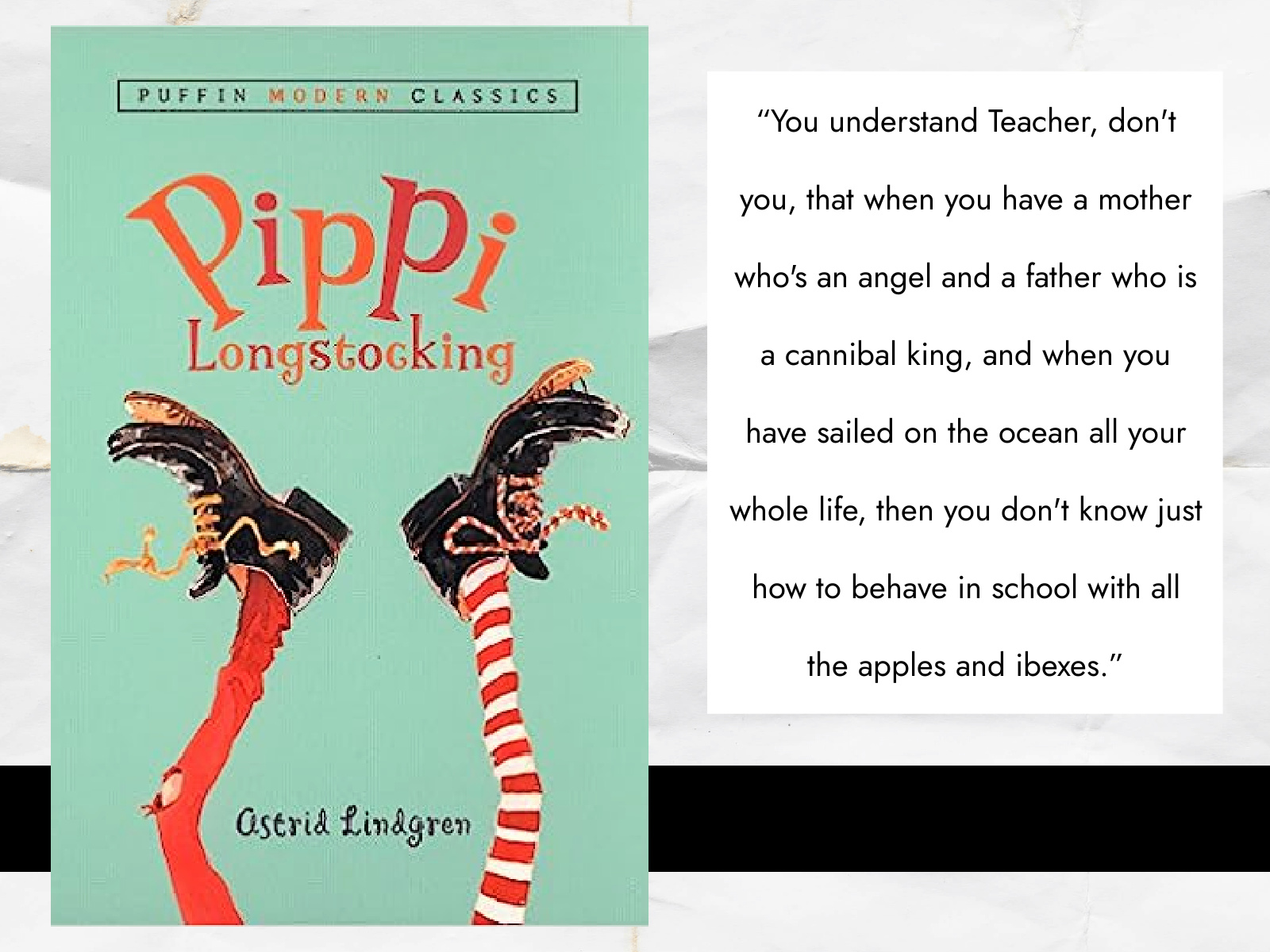
Clock Dance, by Anne Tyler: Willa Drake has experienced a handful of pivotal moments in her life: in 1967, at age 11, a family hardship forces her to grow up too soon; in 1977, she decides how she will spend the next few decades of life; and in 1997, her future is upended in a tragic accident. (IF YOU ARE AVERSE TO SPOILERS, PLEASE DON’T READ THE PUBLISHER’S SYNOPSIS, AS IT GIVES AWAY SPECIFICS OF THESE PIVOTAL MOMENTS; I WOULD HAVE PREFERRED DISCOVERING THESE AS I READ.)
In 2017, Willa is in her sixties with little to look forward to. So when she receives a mistaken call from a stranger seeking assistance, Willa leaves her Arizona home for Baltimore to care for Cheryl, the temporarily-orphaned 9-year-old daughter of a woman she’s never met. Cheryl and Willa soon become fast friends, forging the grandmother/granddaughter relationship they didn’t know they needed. After a lifetime of falling into the paths life had set for her, Willa is forging new territory and likes the view, with its overly friendly neighbors and a renewed sense of purpose. This new life begins to mend the wounds that time had etched into her soul, but it remains to be seen whether or not Willa will embrace the healing.
This book does not have very good reviews, and I can understand why many readers may not enjoy this: it is very slow, and Willa’s apathy can be frustrating to read. But I loved this quiet, literary story with its charming characters (despite several loathsome ones), unique plot structure, and themes of found family, redemption, and subtle empowerment. This is a later-life coming of age story and I appreciated the opportunity to watch Willa grow, while also getting a glimpse into the forces that had kept her stagnant. This is not a particularly hopeful read, but there is hope on the horizon and I liked this realistic tone.
Mostly, I just love Anne Tyler’s writing. I fell in love with her perceptive, straightforward style when I read French Braid last year and that is present here, too. Tyler writes characters who are believable and relatable, to the point where I am certain I am reading a true story, yet the insights she offers into the most seemingly mundane details fascinate me. Tyler genuinely understands people and people’s experiences, our motives and our idiosyncrasies, what makes and breaks relationships and how they mend. Tyler’s prose is heavy with metaphors that are too obvious too miss, but subtle enough that they don’t overpower the story.
This was published in 2018 and there are some uncomfortable body references that likely wouldn’t be included in the book today given heightened sensitivities relating to body shaming. Also of note is Willa’s old-fashioned sensibilities (particularly her aversion to technology) that seems strange for the 2017 setting and even more strange six years later. For the most part, though, this book holds up well and has me convinced of Anne Tyler’s literary brilliance. I intend to make my way through more of her canon, and thankfully there are decades of books to choose from.
My Rating: 4.25 Stars // Book Format: Kindle
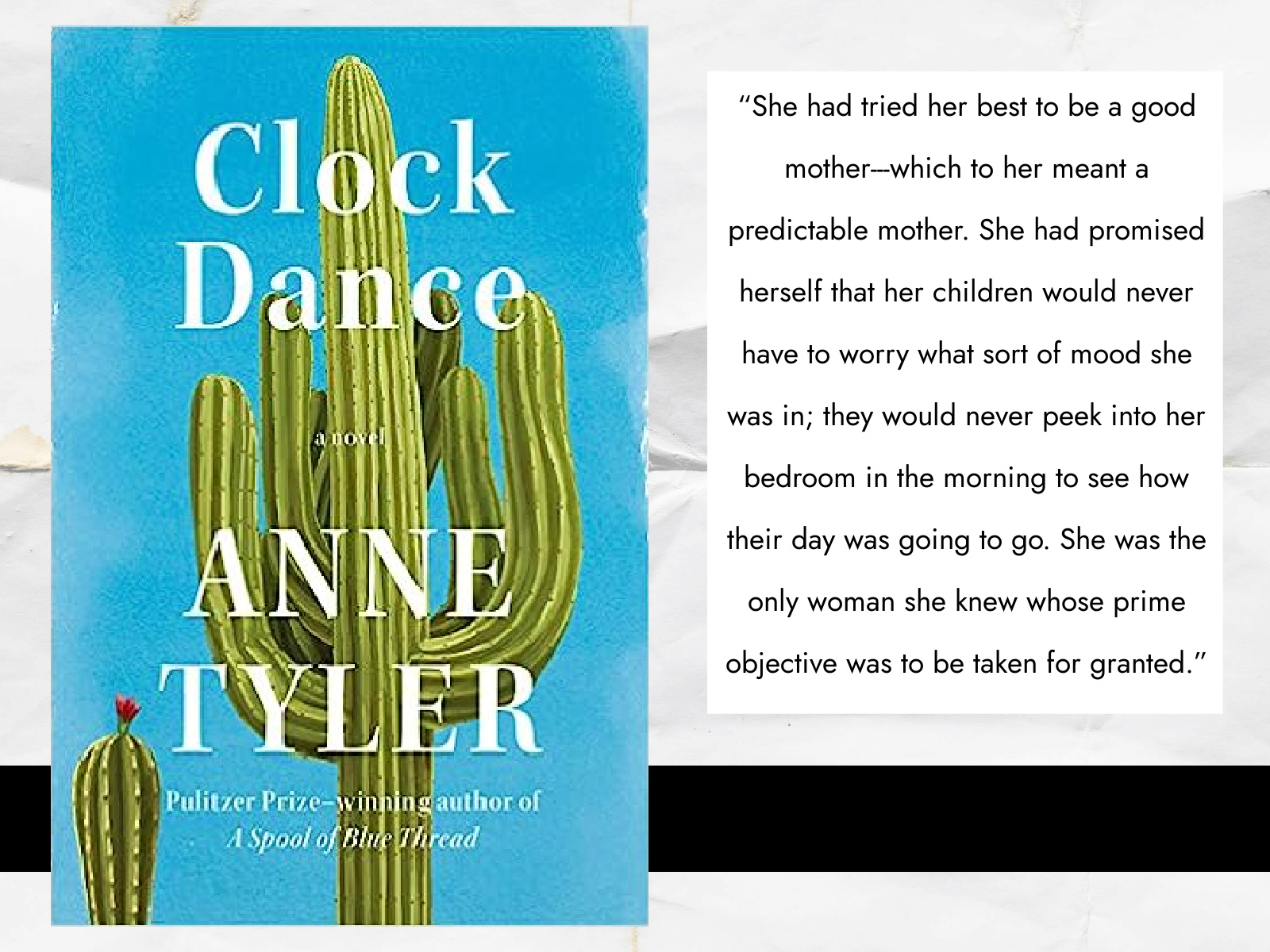
NONFICTION
Take Back Your Family: From the Tyrants of Burnout, Busyness, Individualism, and the Nuclear Ideal, by Jefferson Bethke: Families are struggling, and Jefferson Bethke says that the West’s “multi-century experiment with the nuclear model” is to blame. Its focus on individualism has led to broken homes and a failure to live out God’s intended design for family as a place of cooperation, thriving, and united purpose. In this book, Bethke explores the history and (he says) downfall of the Western family and offers suggestions for families seeking connect and thrive. He relies heavily on business and sports models and metaphors, as well as historical case studies and anecdotes from families who are successfully taking their families back from a culture that tried to strip them of their purpose and cohesiveness.
This book confused me. At the outset Bethke thoroughly tears down the “traditional” family model that most westerners recognize. (If it isn’t the model we know personally, it is likely one to which we aspire, and it is the model many traditional Christians would point to as God’s best). Bethke makes some excellent points about the bias towards individualism over collective good, and how “dad goes to work and mom stays home” is not how families have always been, and is not at all the ideal (compared with families throughout most of history and especially within the Bible, when family life was centered around home). However, in pointing to the shortcomings of this model he seems to be blaming family itself for much of society’s and Christianity’s woes. He apparently views family as the culprit and not one of many unfortunate victims of culture’s demise. And while I don’t disagree that the nuclear family model isn’t necessarily prescribed in scripture, the model itself is not at all un-Biblical or sinful.
Bethke’s tune quickly shifts after the first few chapters, though, to helping nuclear families find a better way. I really liked this second half of the book, but it seemed to contradict the earlier chapters in ways that had me scratching my head and wondering where his editors were.
The ideas and tools offered in the book’s latter chapters are great ones. I love the idea of adopting team language, developing family mission statements, identifying and harnessing the skills of each family member, and integrating training and rhythms of rest into the family routines. While I wished there was more Scripture embedded in these pages, the book IS well researched, and its numerous stories make for an entertaining read. But after those first few chapters that are not at all helpful or (in my opinion) accurate, I couldn’t embrace this messaging as much as I would have liked.
I don’t regret reading this as it jumpstarted a few ideas I’ve wanted to implement in our family. I also found the case studies very inspiring, and I loved all the historical tidbits! But I don’t know that I would fully endorse this for other readers. If you’re looking to expand upon your family’s mission and impact, I’d refer you to Belonging and Becoming instead. I found it to be more uplifting, more actionable, and written from a place of greater life experience and maturity.
My Rating: 3.5 Stars (Rounded to 3 stars on Goodreads) // Book Format: Kindle
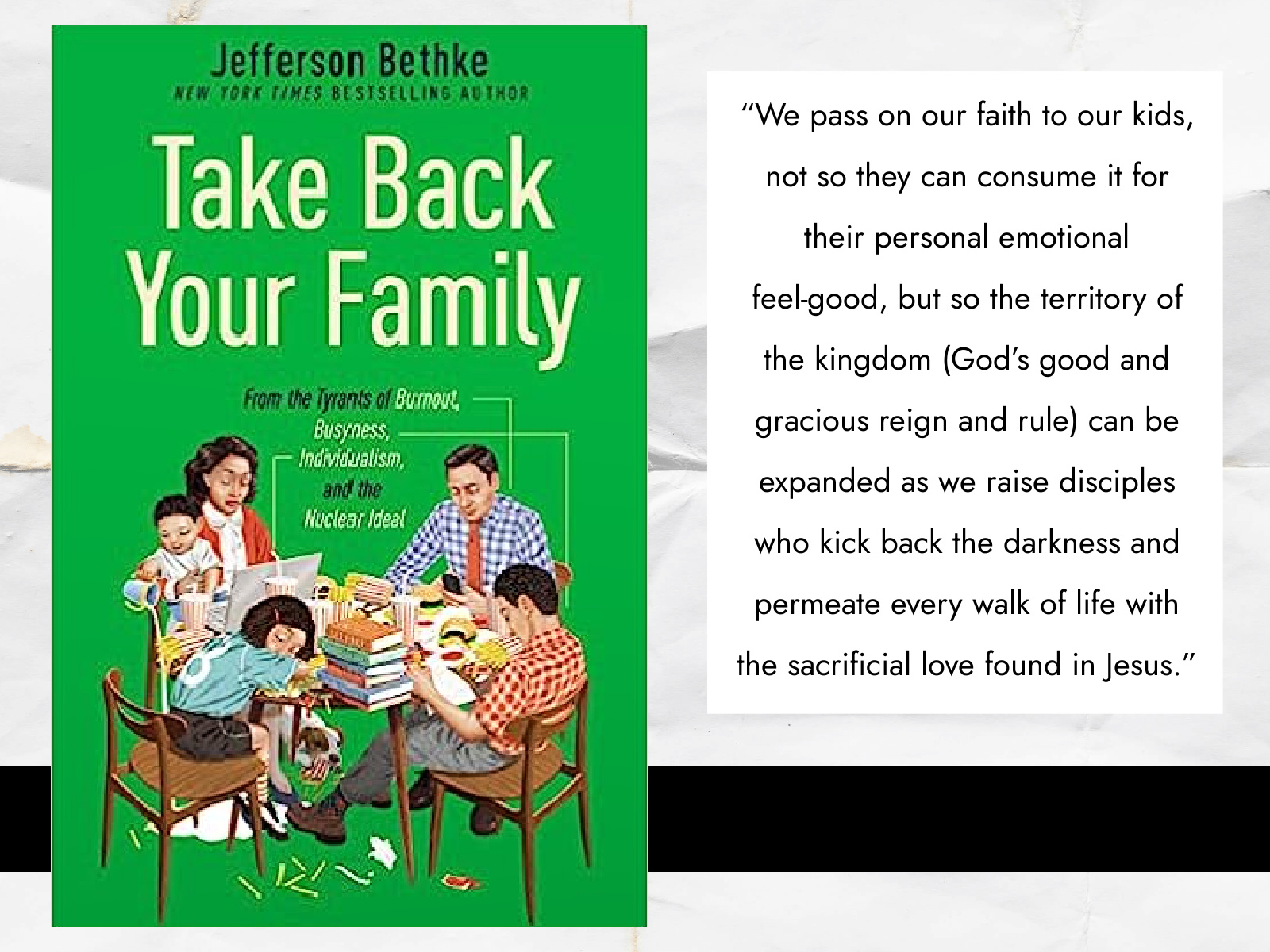
Help Your Kids Learn & Love the Bible, by Danika Cooley: As a mother who loves Jesus and cherishes His Word, I want the same for my children and am eager for all the resources that will help us make this a reality. In this book whose title explains it all, a Bible curriculum developer and homeschool mother of four gives parents tools for studying the Bible as a family. In addition to specifics for when and how to fit Bible reading into our family rhythms, Cooley offers a helpful overview for how to read the Bible faithfully (with explanations of the Bible’s authorship, structure, and primary themes). She also gives practical strategies for memorizing, praying, and applying Scripture.
While much of the advice offered in these pages was familiar to me (and things we’re already doing as a family), I was encouraged by this book, especially Cooley’s example of a family who has successfully studied and learned to love the Bible. This book inspired me to continue reading the Bible aloud with my kids and was a good reminder to build some of the Biblical study tools into our reading; I’m particularly interested in working through a catechism. I also loved the continual reminders that the Bible is not too hard or advanced to read as a family!
This is a really great guide, with helpful anecdotes, strong foundation of Bible knowledge, and an awareness of learning methods, styles, and child development. It’s perfect for homeschooling families, but useful for everyone who wants to raise kids who know the Bible.
My Rating: 4 Stars // Book Format: Audiobook
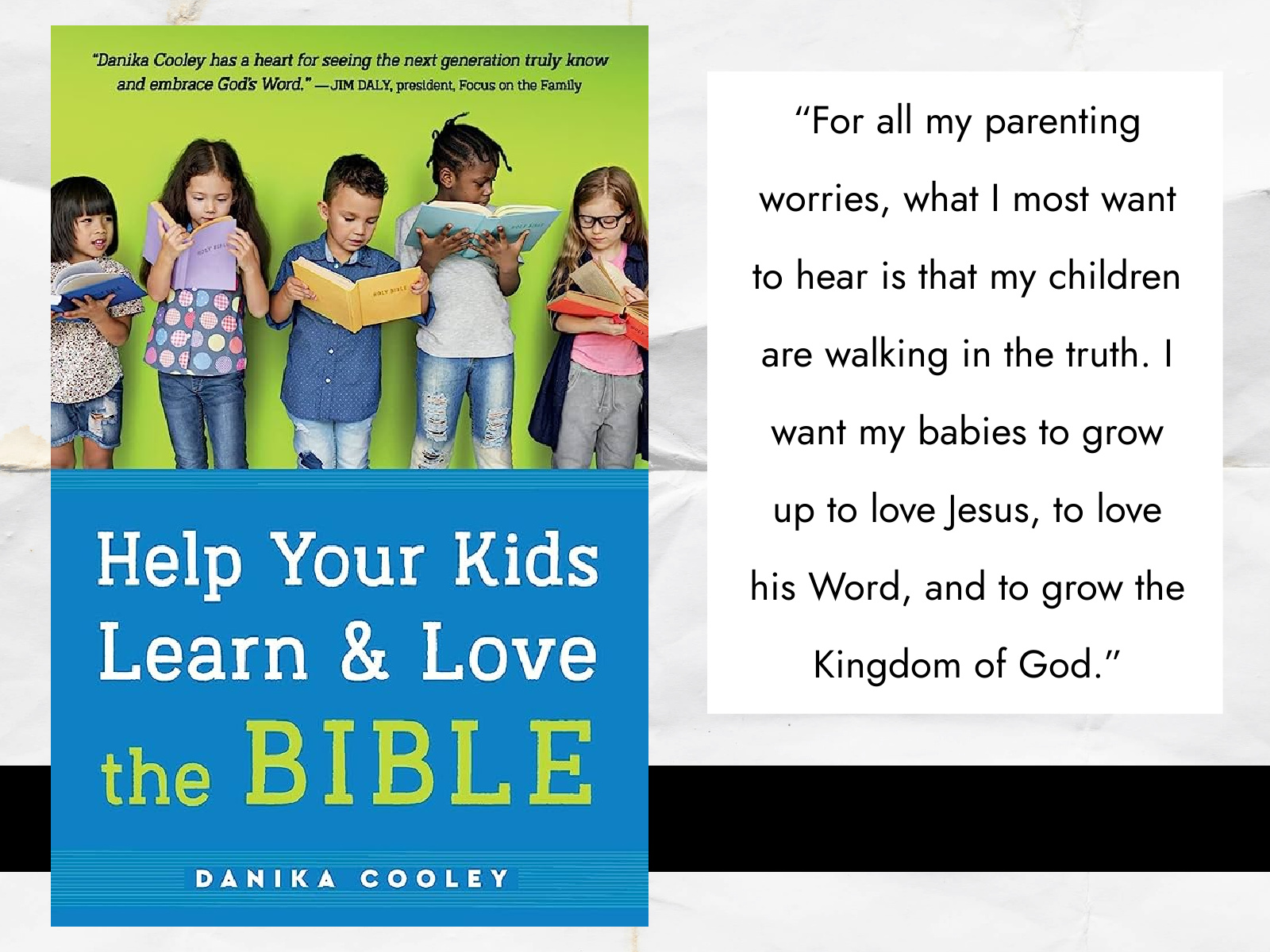
Dumbing Us Down: The Hidden Curriculum of Compulsory Schooling, by John Taylor Gatto: Let me preface this by saying that I am a product of the public school system (preschool through 12th grade, minus one year of homeschooling). I have a degree in elementary education, and I taught in a variety of school settings, including public schools. However, we have chosen to homeschool our children and don’t ever see ourselves enrolling them in public schools. The reasons for our decision to school our kids at home are numerous, but many stem from the issues outlined in this collection of essays from a New York City public school teacher who concludes that compulsory government education is ineffective for producing competent, free-thinking, curious, resilient citizens.
Though first published more than thirty years ago, the ideas here are still timely and important, probably more now than before as I don’t believe the structures and methods in schools have changed much from Gotti’s teaching days until now. I agree that there are systemic flaws in our approach to public education and that we must rethink how and why and what we are teaching our kids.
All that said, I feel that Gotti’s arguments are unnecessarily harsh and also inconclusive. Gotti’s teaching experience was limited to one school district, and I feel it was unfair for him to extrapolate this one setting to the whole of American education. Gotti romanticizes education outcomes of past generations, neglecting to acknowledge that educational opportunities were not available AT ALL to a vast majority of individuals across history. He minimizes the efforts and expertise of school teachers and the value of structured, formal education (for instance, I do not agree that 100 hours of reading instruction is all that is needed to achieve competent literacy, as Gotta suggests).
This is an important read for anyone in the realm of education (either a school teacher or parent of students) as it highlights shortcomings of current educational methods. However, it does more to raise questions and present reasons for concern than offer useful alternatives. This collection is a valuable discussion starter, but it is far from the final word on education in America.
My Rating: 3.75 Stars // Book Format: Audiobook
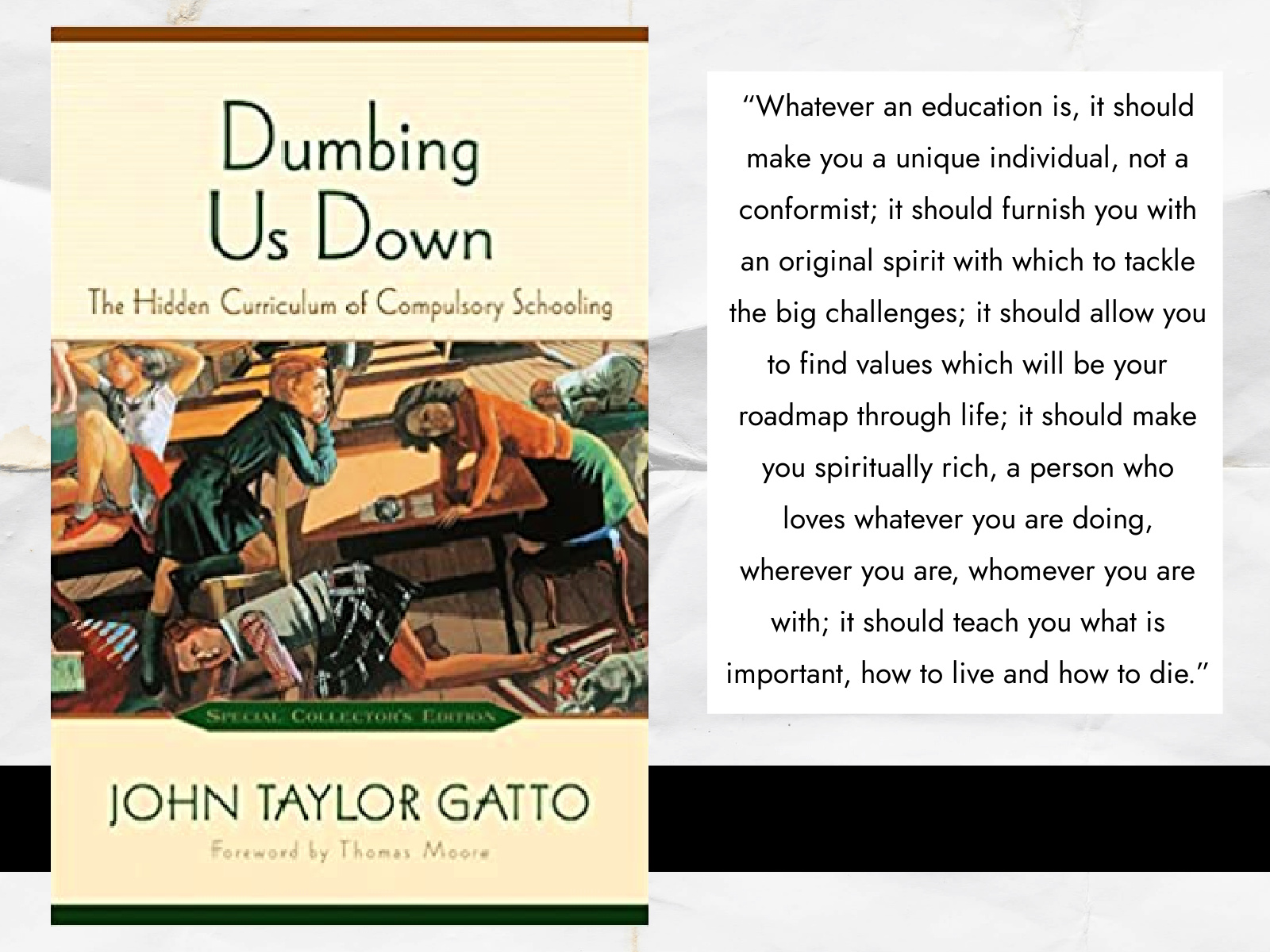
Domestic Extremist: A Practical Guide to Winning the Culture War, by Peachy Keenan: Not so long ago, women who chose to stay married to their (one) husband, have many children, and prioritize family over career were considered “normal.” Now, this is deemed by society as extreme. In this snarky screed against modern feminism and secular culture, Peachy Keenan—a former feminist and atheist turned devoted wife, Catholic, and mom to five—shows how we got here and what we can do about it. She looks at all the hot-button culture issues (abortion, gender, fertility, and evolving values), explaining how culture’s modern approach has been destructive for everyone, particularly women and children. She shares her own twisty journey and inspires others to stand up for their families, their femininity, and their values.
I’ve read a number of books on similar themes, but this one feels different. It is uproariously funny with snarky humor that is a little cruel but also insightful and absolutely relevant. I agree with nearly all of Peachy’s views (I, too, would qualify as a Domestic Extremist, having scored 11/12 on the Are Domestic Extremist? quiz in the book’s preface—I sadly lost a point for having fewer than four children). And her examination of historical trends and current statistics was a helpful reminder of why I have chosen to live this life of staying home with my kids.
Though I won’t deny the humor in this book, I didn’t always love the biting tone or the warlike stance. I do think we are in a culture war of sorts, but I don’t know how helpful this tribal rhetoric is. (My differing thoughts on this may stem from the fact that I came to my values and beliefs differently from Peachy, whose faith seems to be a byproduct of her politics whereas I let my political views flow from my faith. We arrived in similar places, but this difference explains our approaches to how we address/share our values with others.) Many of her critiques of feminists seem harsh and undeserved, and she discredits the very real hurdles of underprivileged women who would love to be domestic extremists but are unable to make it a reality. She does attempt to address this at the end of the book, but her suggestions are more systemic than actionable for the reading audience.
If your are expecting a skills-based book about homemaking, you won’t find that here. Peachy admits that she does not love housework and has zero crafting or cooking skills, and I appreciated this about her as I, too, feel called to stay home but am not the most “domestic” parent by traditional standards. It is helpful to distinguish those skills from motherhood—one does not necessarily require the other!
I’d be curious to know how this book lands with those who are not in Peachy’s same conservative demographic. I wonder if her strong stance and sarcasm would appeal to skeptics or turn them away. I hope that her words have at least given some women a new way of thinking about family, gender roles, and the value of building a lasting family legacy.
My Rating: 4 Stars // Book Format: Audiobook
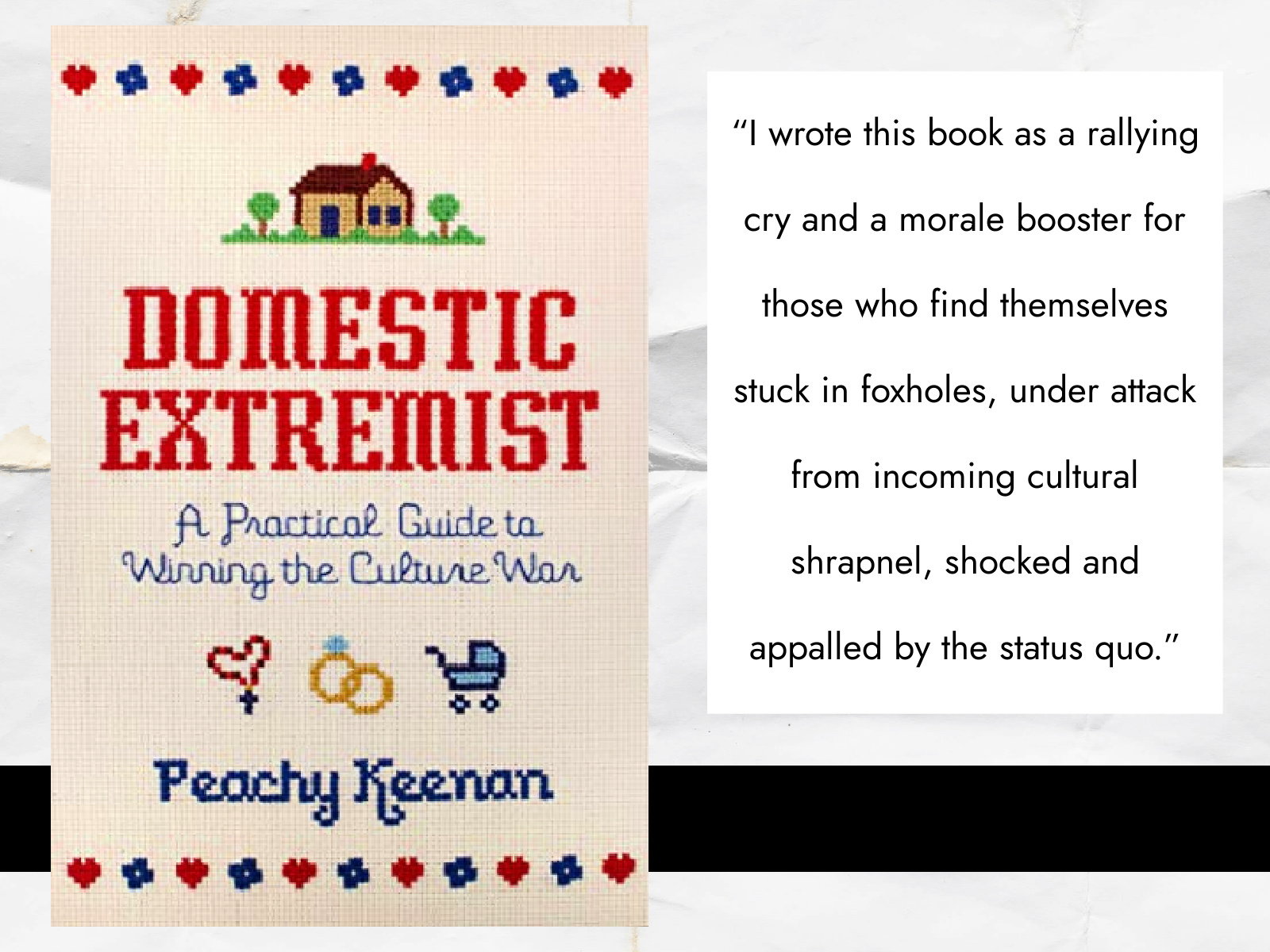
The Toxic War on Masculinity: How Christianity Reconciles the Sexes, by Nancy Pearcey: It’s rare to hear the word “masculinity” these days without the modifier “toxic” accompanying it. But masculinity has not always been associated with danger, destruction, and debauchery. In this essential work that blends history, sociology, psychology, and Biblical principals, theologian Nancy Pearcey disentangles the concepts of masculinity and toxicity, differentiating between the qualities of a “good man” and a “real man.” She takes us on a fascinating journey through the history of gender roles, stereotypes, and expectations in America, examining ways that the sacred and secular ideas around these topics have commingled. And using anecdotes, studies, and historical documents, Pearecy examines ways that the elevation and denigration of BOTH sexes at alternating times in history has led to our current unhealthy and unbiblical understanding of true masculinity and femininity. Most importantly, Pearcey dispels the myth that evangelical Christian men are quintessentially toxic, and she paves a way forward for healthy marriages, families, and cultural understanding of men and women, in and out of the church.
It’s not an exaggeration to say that this is one of the most (if not THE most) important books I’ve read in years. Pearcey has taken this extremely controversial and sometimes confusing subject and not only shown HOW and WHY we got here, but what to do next. The books is long and impeccably researched (more than a third of the book consists of endnotes), but it is not a difficult read. There are a lot of moving pieces in this history (more than I realized), but Pearcey weaves them together in ways that make sense, with plenty of recapping and necessary commentary in which she infuses Scriptural takes on these ideas that culture has gotten wrong.
Perhaps my favorite aspect of the book is its tone: Pearcey is pragmatic and speaks truth without resorting to inflammatory language. She neither vilifies nor deifies either men OR women, and she acknowledges negative behavior and trends without animosity. This book is helpful and practical and also timely. It answered many of my own questions about what constitutes a “good man” and how that manifests today, and it tied together a lot of loose threads that other books I’ve recently read on the subject had left hanging.
With the subjects of gender/patriarchy/feminism/etc. at the forefront of many cultural conversations these days (looking at you, Barbie movie and Andrew Tate), this book was the WHOLE and unvarnished truth I needed to read. Aspects of the book have come up in almost every conversation I’ve had in recent weeks and I want more friends and family to read this so we can discuss further!
My Rating: 5 Stars // Book Format: Kindle
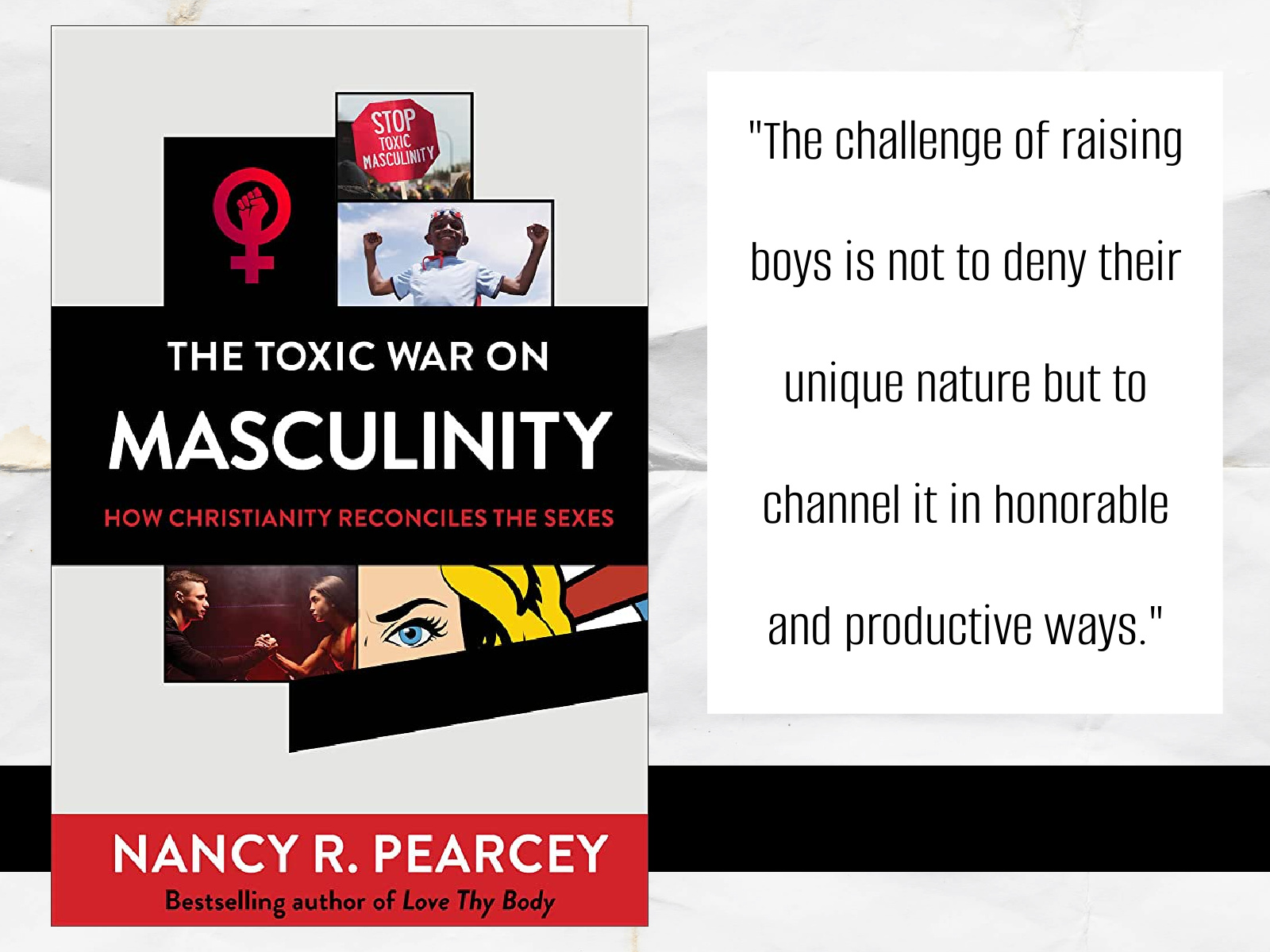
The Well-Watered Woman: Rooted in Truth, Growing in Grace, Flourishing in Faith, by Gretchen Saffles: Jesus promises that He will satisfy us with water that never runs dry. But many Christian women find themselves languishing, spiritually parched and lifeless. It’s easy to turn to the world for validation and refreshment, but true hope, purpose, and abundance come from surrendering to the Lord, bringing Him our empty cups and allowing Him to fill us with His flowing water of life. In this inspirational book, Gretchen Saffles—a young wife, mom, and Bible teacher—shares stories from Scripture and her own life as she expands upon what it means to be a well-watered woman, rooting ourselves in Christ and trusting Him to work within us. She offers guidance on studying God’s word and making it the foundation of our lives, and she outlines a path towards spiritual living for disciples of Christ.
I have to admit that I’m a little baffled by the enthusiasm for this book that has excellent reviews on Goodreads and Amazon, and was endorsed by several well-known women in the Christian world. I picked it up for a book club with church, which was what kept me reading after the first third of the book left me feeling underwhelmed. Parts Two and Three are much stronger and actionable, and less cliché-heavy, so I’m glad I saw the book through to the end. However, I don’t know that I am the right reader for this one: the theology is solid, but the themes are predominantly a repackaging of Biblical truisms familiar to anyone who has spent time as part of God’s family.
Granted, The Well-Watered Woman is a very attractive repackaging: the cover is gorgeous, and there are beautiful floral illustrations throughout. I’m not a plant lady, but I really liked the numerous plant metaphors, and I enjoyed Gretchen’s writing style and found her very relatable. But I wanted more from this book that didn’t measure up to the hype. Still, I could see a new believer really appreciating this, and with the lovely cover it would make a nice gift.
My Rating: 3.75 Stars // Book Format: Print
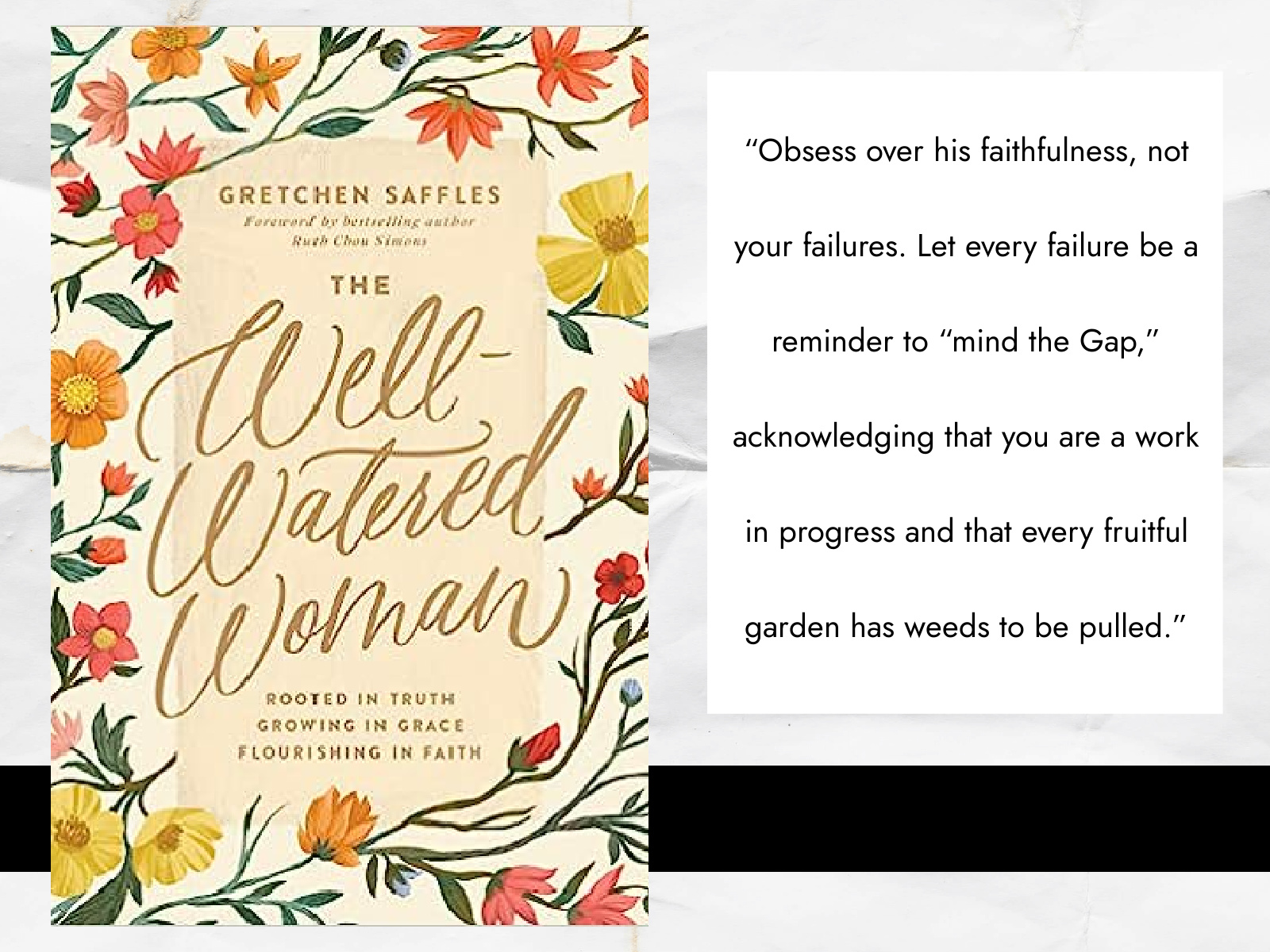
A Prayer in the Night: For Those Who Work or Watch or Weep, by Tish Harrison Warren: “Keep watch, dear Lord, with those who work, or watch, or weep this night, and give your angels charge over those who sleep. Tend the sick, Lord Christ; give rest to the weary, bless the dying, soothe the suffering, pity the afflicted, shield the joyous; and all for your love’s sake. Amen.”
These are the words of Compline, from the Book of Common Prayer, and this simple but powerful prayer forms the framework for this book written by an Anglican priest. As a lifelong non-denominational Protestant, I don’t have much experience with praying scripted prayers, but after reading this book I would like to do more of it. Harrison begins the book with a tragic personal story in which praying Compline brought healing and reassurance of God’s presence. Harrison explains that although many of us primarily pray spontaneously, “for most of church history, Christians understood prayer not primarily as a means of self-expression or an individual conversation with the divine, but as an inherited way of approaching God, a way to wade into the ongoing stream of the church’s communion with him.”
Harrison goes on to explore themes of vulnerability (as seen in those “who work and watch and weep”), examining the importance of work, the value of looking ahead towards Christ, and the lost art of healthy grieving. Further chapters unpack a Biblical and historical understanding of weakness, embodiment, suffering, miracles, doubt/belief, and learning to acknowledge our facility while also pursuing joy even in the midst of suffering.
THIS BOOK IS AMAZING! I highlighted something on nearly every page, so I won’t go into all of my favorite parts (though I may dedicate a full blog post to the book in the future). I loved the liturgical bent combined with Scriptural grounding and engaging stories. I resonated with every single theme, and felt both seen and better able to see others through Warren’s words. This is a deeply human book, but one that points to the existence and sovereignty of our Creator. It feels counter to both church and secular culture in deeply healthy ways. I had no idea of the beauty that awaited me when I picked this up; I’m already looking forward to a reread.
My Rating: 5 Stars // Book Format: Kindle
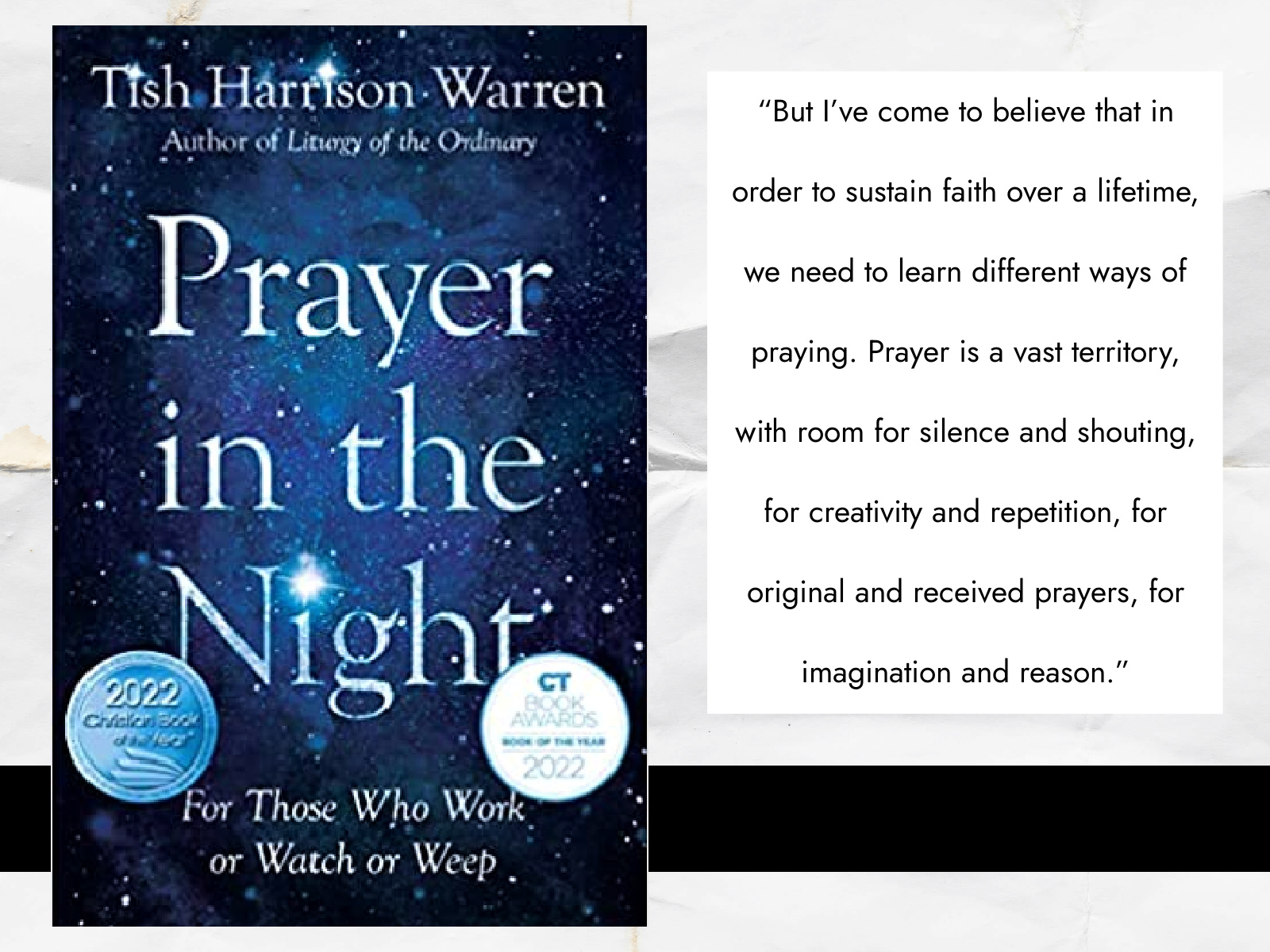
The Spirit of the Disciplines: Understanding How God Changes Lives, by Dallas Willard: As Christians, we desire and aspire to emulate Jesus. We want to love others as He did and grow in holiness and purity, but many of us are unsure of how to get there. Even if we are familiar with the concept of spiritual disciplines, we don’t always know what they are, and we certainly don’t know how or even why to practice them. In this book published nearly forty years ago, Dallas Willard—one of the most influential theologians of his era—argues that, “We can increasingly resemble Christ in character and in power by following him in his overall style of life … This was the method of his earliest disciples, and it is as valid today as it was then.”
Willard digs into the theology of spiritual formation, expounding upon the nature of life, sanctification, embodiment, and spiritual fulfillment. He examines the history of the disciplines and why they have largely fallen out of favor among contemporary Protestants. He the expounds upon the life and words of Jesus to make a case for how and why we should still be practicing them today. Though a majority of the book is an unpacking of the why of spiritual disciplines, Willard does dedicate a chapter to the thorough explanation of what these disciplines are and how we can embrace them. Willard ends with powerful chapters on the subjects of poverty (spoiler: it’s not as spiritual as some make it out to be) and how the disciplines play out in the secular world (this chapter was my favorite of all).
This was the first book I’ve read from Dallas Willard, but I am aware of his influence on many of my favorite Bible teachers, so I was excited when Luke suggested we read this together as a way of getting back to the “source material” of more contemporary books on spirituality. I am so glad that we read this, as it gave me a more robust understanding of the disciplines and why they are important. The writing is tedious at times and reads very academic, so I would not hand this book to a new believer; but having personally been immersed in this world of spiritual formation for a while, Luke and I both loved Willard’s refusal to “dumb down” his material. We were surprised by how relevant this book felt, speaking directly to issues still at play in the church so many decades after the book was published.
Reading this was a mental and spiritual workout, but one I was craving. I can’t wait to dig more into more Willard’s work in the future!
My Rating: 5 Stars // Book Format: Kindle
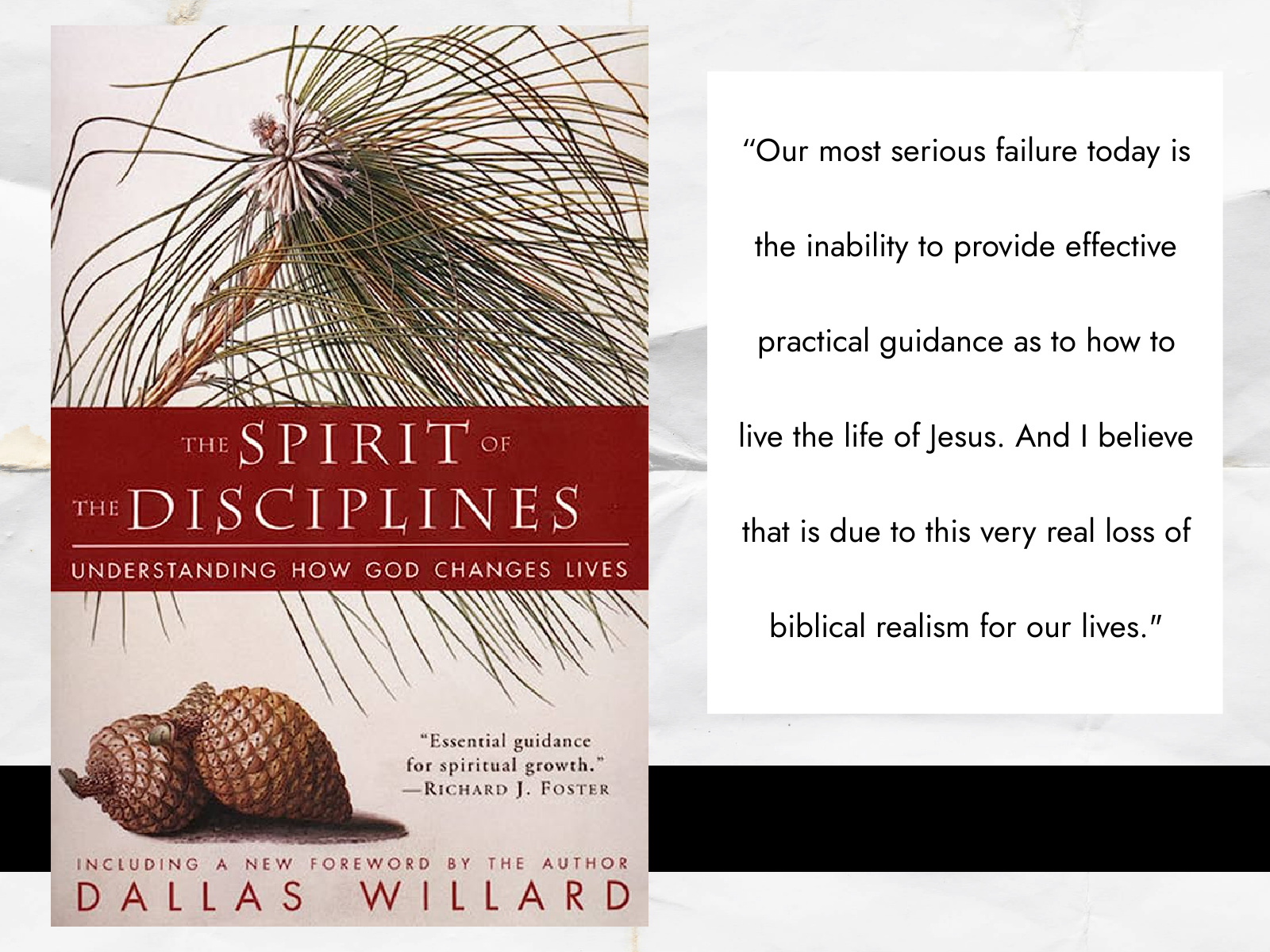
What have you been reading lately? Any books to recommend?
I love No Two Persons and your review is brilliant! I wasn’t ready to let go of one story….especially the teenager. I’d like to do a reread before year’s end.
Actually, Clock Dance is one of Tyler’s books that I liked or was intrigued by! Tyler’s writing is usually a bit too quiet for me (although I do appreciate her mastery).
I’ll have to read more of Anne Tyler but so far she’s a great fit for me.